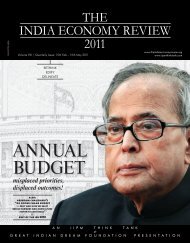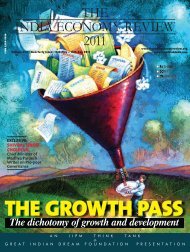Download - The India Economy Review
Download - The India Economy Review
Download - The India Economy Review
Create successful ePaper yourself
Turn your PDF publications into a flip-book with our unique Google optimized e-Paper software.
eradication of poverty and the pursuit of<br />
economic equality for all. According to<br />
World Bank, in 2005, 41.6 percent of <strong>India</strong>ns<br />
lived in poverty with less than $1.25<br />
per day. In 2008, the mortality rate for<br />
children under the age of fi ve stood at 69<br />
per 1,000 which is a little less than in<br />
Haiti (72 per 1,000) and more than in<br />
China (21 per 1,000). Hardly any evidence<br />
could further dispute the<br />
self-destructive nature of socialist<br />
economic policies to deliver the<br />
promised goals.<br />
<strong>The</strong> failure of socialism in development<br />
policy refl ects its misunderstanding<br />
of the emergence of<br />
economic system as an order<br />
of spontaneous creation.<br />
Socialist political experiment<br />
rests mainly on the<br />
idea of guiding the development<br />
policy through economic<br />
dirigisme. In the<br />
course of political<br />
economic history,<br />
C OMPARATIVE PLANNING<br />
socialist political leaders pledged on the<br />
promise of delivering social goals such as<br />
free education and health care and a better<br />
standard of living for all members of<br />
society. <strong>The</strong> socialist philosophy of economic<br />
policy is mainly derived from the<br />
philosophical thought of Marx, Hegel,<br />
Rosseau and Lenin. <strong>The</strong> epistemological<br />
nature of economic philosophy is subject<br />
to the perception of human nature of<br />
greed in relation to the concept of “homo<br />
economicus” fi rstly developed by Adam<br />
Smith in “<strong>The</strong> Wealth of Nations”. In its<br />
origins, the conceptual framework in development<br />
policy depends on which economic<br />
philosophy shall prevail as a set of<br />
guiding principles in the policy course.<br />
<strong>The</strong> rise of the British empire in the 19th century of the Victorian age to the world<br />
political and economic giant was largely<br />
based on the legacy of the economic<br />
thought from enlightenment which<br />
stressed the importance of free market,<br />
sound money and limited government<br />
which focused on the enforcement of the<br />
rule of law. <strong>The</strong> intercourse of development<br />
policy in each country lies fi rmly on<br />
the grounds of formal and informal institutions.<br />
<strong>The</strong> interaction between formal and<br />
informal institutions is one of the most<br />
powerful determinants of a perspective of<br />
economic development in a long term.<br />
Formal institutions such as the constitution<br />
and legislative laws are nonetheless a<br />
central element on which the creation of<br />
the fundamentals for the pursuit of economic<br />
development is based. However,<br />
formal institutional phenomena could not<br />
be explained without a proper understanding<br />
of informal institutions such as<br />
ethics, culture and habits. <strong>The</strong>se institutions<br />
endogenously determine the very<br />
nature of formal institutions since the latter<br />
are not established mechanistically but<br />
THE INDIA ECONOMY REVIEW<br />
99





